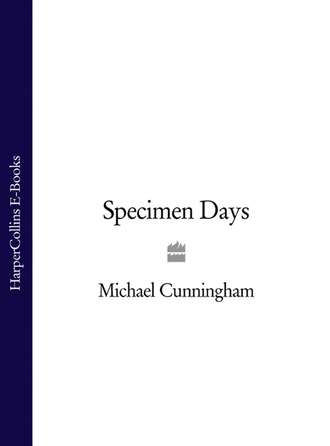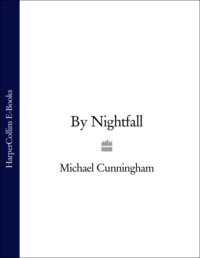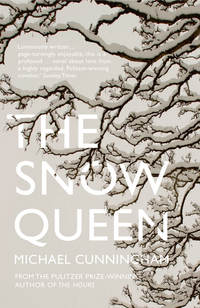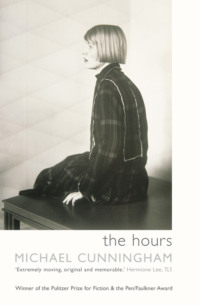
Полная версия
Specimen Days
How could she know that? Had she been listening to him, all this time, when he spoke as the book? If so, she’d given no sign.
He couldn’t control himself. He said, “The bride unrumples her white dress, the minute-hand of the clock moves slowly.”
Catherine blinked. Her eyes were bright.
She asked, “What did Simon tell you?”
What had Simon told him? Nothing. Simon sang the old songs, teased Lucas for being small, went to Emily’s room in secret.
Lucas said, “The nine months’ gone is in the parturition chamber.”
Catherine dropped the money at Lucas’s feet. One of the coins rolled and stopped against the toe of his boot.
“Pick it up and take it home,” she said. “I have no more patience for you.”
He said, “The prostitute draggles her shawl, her bonnet bobs on her tipsy and pimpled neck.”
Catherine began to weep. It took her like a spasm. She stood one moment erect, with a single tear meandering down her cheek, and the next moment her face sagged, and the tears came coursing out. She put her face into her hands.
He couldn’t think what to do or say. He put his fingers gently on her shoulder. She shrugged him away.
“Leave me alone, Lucas,” she sobbed. “Please, just leave me alone.”
He couldn’t leave her weeping on Eighth Street, with people passing by. He said, “Come with me. You must sit down.”
To his surprise, she obeyed. She had lost herself to weeping. She had become someone who wept and walked with him as he led her back to Washington Square, where the child’s pennant snapped against the sky and the flute player hopped nimbly from foot to foot.
He found a bench and sat on it. She sat beside him. Timidly, he put his arm over her shaking shoulders. She didn’t seem to mind.
He said, “I’m sorry. I didn’t mean to upset you. I don’t know what I said.”
Her weeping diminished. She raised her head. Her face was red and haggard. He had never seen her so.
“Would you like to know something?” she said. “Would you?”
“Yes. Oh, yes.”
“I’m going to have a baby.”
Again he paused in confusion over something that was true but could not be true. She hadn’t married.
He said, “I see,” because it seemed what he ought to say.
“They won’t keep me at work. I’ll be too big to hide it in a month or so.”
“How could you get too big to go to work?”
“You don’t know anything, you’re a child. Why am I talking to your?”
She made as if to rise but sank down again on the bench. Lucas said, “I want you to talk to me. I’ll try to understand.”
She went away again, into her weeping. Lucas put his arm again across her shoulders, which shook violently. The people who passed looked at them and then looked politely away, to help deliver Lucas and Catherine from their own shamefulness. The people who passed were intricately made, with gold buckles and little clocks on chains. Lucas and Catherine were made of cruder stuff. If they lingered on the bench, a policeman would come and send them along.
At length Catherine was able to say, “I’ve spoken to no one of this. It isn’t fair, saying it to you.”
“It is fair,” he said. “You could never be anything but fair.”
She gathered herself. She wasn’t through crying, but her aspect changed. Something new took hold of her, a rage with grief caught up in it.
She said, “All right, then. I’m going to teach you something.”
“Please.”
Her voice when she spoke was like a wire, thin but strong.
She said, “I told your brother he must marry me. I don’t know if the child is his. It probably isn’t. But Simon was willing. Would you like to know something else?”
“Yes,” Lucas said.
“I suspect. He had his accident because he was unhappy. He may have been so distracted by the thought of our wedding that he allowed it to happen. Think of it. He’d been in the works for years. He knew better than to let his sleeve get caught.”
Lucas said, “Simon loved you.”
“Did he tell you that?”
“Yes,” Lucas said, though Simon had never said the words. How could he help loving her? Not everything needed to be said in words.
Catherine said, “I’m a whore, Lucas. I tried to force myself on your brother.”
“Simon loved you,” he said again. He couldn’t think of anything else.
Catherine said, “I’m going to have the baby. It’s what I can do for poor Simon.”
Lucas could not think of an answer. How could she do anything but have the baby?
She said at length, “I told him he’d taken advantage, I told him he must make it right. I told him he’d come to love me, in time. So there you are. I’m a whore and a liar and I’m going to give birth to your brother’s bastard. You mustn’t come to see me anymore. You mustn’t buy me things with the money you need for food.”
Her face took on a new form. It grew older; its flesh sagged. She became a statue of herself, an effigy. She was not who she’d been. She was going somewhere.
Lucas said, “I can help you.”
She stood with grave finality. She was formal now.
“No one can help me,” she said.
She walked resolutely eastward, toward home. Lucas went alongside her.
“You are in danger,” he said.
“I’m in the same danger as every woman who draggles her shawl, neither more nor less.”
“Don’t go to work anymore. Please.”
“Soon enough I won’t be going to work anymore. That will happen regardless.”
“No. Tomorrow. Don’t go tomorrow, you’re in danger.”
“I’ll need every penny I can get, won’t I?”
“The dead search for us through machinery. When we stand at a machine, we make ourselves known to the dead.”
“Your precious book.”
“It isn’t the book. It’s true.”
He confused himself. The book was true. What he was trying to tell her was differently true.
She walked on. Her new face, reddened and ravaged, cut through the air. She might have been the carved woman at the prow of a ship.
She said, “I can’t worry about you anymore. I’m sorry, but I can’t. I have too much else to think about.”
“You don’t need to worry about me. Let me worry about you. Let me help you. Let me care for you.”
She laughed bitterly. “What a good idea,” she said. “I’ll come live with you and your parents. We’ll live, all four of us, on what you make at the works. No, there will be five. That shouldn’t be a problem, should it?”
For a moment, Lucas could see her as she’d said she was: a whore and a liar, a woman of the street, hard and calculating, naming her price.
He said, “I’ll find a way.”
She stopped, so abruptly that Lucas went on several paces ahead. Foolish, he was a foolish thing.
She said, “Forget me. I’m lost.”
He said, “Undrape! you are not guilty to me, nor stale nor discarded.”
She emitted a small, muffled cry and continued walking. He stood watching the back of her blue dress, the pile of her copper-colored hair, as she passed out of the square.
Always, then, it—everything—made a more complete and sickening sense. Simon would want her and the child as well. He sought to marry her in the realm of the dead, to live there with her and his child.
She must be prevented from going to work tomorrow.
Lucas couldn’t think what to do, yet he must do so much. He must keep her from her machinery. He must find money for her.
He remembered the money she’d thrown at his feet. He hadn’t picked it up. He ran back to Eighth Street for it, but of course it was gone.
He walked east on Eighth Street. He thought perhaps he could find the money again, if not the coins Catherine had tossed at his feet then some other money, some equivalent sum that might be out there, sent by a heavenly agency that forgave and abetted foolish hearts. He thought that if he scoured the city, if he went high and low in it, he might happen onto some money that was not being watched, that belonged to someone but was unattended, dropped on the pavement or otherwise misplaced, as his own coins had been. He didn’t propose to steal, any more than whoever had found his money had stolen it from him. He hoped rather to take his place on a chain of losses and gains, an ongoing mystery of payments made and payments received, money given from hand to hand, to satisfy an ancient debt that had always existed and might be finally repaid in some unforeseeable future. He hoped the city might produce help through incomprehensible means, just as his stamping of iron plates produced housings.
He would search for whatever might be there.
He went along Eighth Street to Broadway. If there was money overlooked, if there were coins carelessly dropped, it was likeliest to happen there.
Broadway was filled with its lights and music, its departing shoppers and its glad men in hats, laughing, blowing smoke from the bellows of their chests. Lucas walked among them, looking attentively downward. He saw the tips of boots, the cuffs of trousers, the hems of skirts. He saw the little leavings that were trod upon: a cigar end, a curl of twine, a canary-colored pamphlet announcing “Land in Colorado.”
He’d gone along for several blocks, twice incurring the muttered indignations of citizens who had to step out of his way, when he came upon a pair of boots that seemed familiar, though he knew he had never seen them before. They were workingman’s boots, dun-colored, stoutly laced. They stopped before him.
He looked up and beheld Walt’s face.
Here was his gray-white cascade of beard, here his broad-brimmed hat and the kerchief knotted at his neck. He was utterly like his likeness. He smiled bemusedly at Lucas. His face was like brown paper that had been crushed and smoothed again. His eyes were bright as silver nails.
“Hello,” he said. “Lost something?”
Lucas had gone searching for money and found Walt. A vast possibility trembled in the air.
He answered, “Stout as a horse, affectionate, haughty, electrical, I and this mystery, here we stand.”
Walt expelled a peal of laughter. “What’s this?” he said. “You quote me to myself?”
His voice was clear and deep, penetrating; it was not loud, but it was everywhere. It might have been the voice of a rainstorm, if rain could speak.
Lucas struggled to answer as himself. What he said was, “The earth, that is sufficient, I do not want the constellations any nearer, I know they are very well where they are, I know they suffice for those who belong to them.”
“How extraordinary,” Walt said. “Who are you, then?”
Lucas was unable to tell him. He stood quivering and small at Walt’s feet. His heart thumped painfully against his ribs.
Walt squatted before Lucas. His knees cracked softly, like damp twigs.
“What’s your name?” he asked.
“Lucas.”
“Lucas. How do you come to know my verse so well?”
Lucas said, “I am the mate and companion of people, all just as immortal and fathomless as myself; they do not know how immortal, but I know.”
Walt laughed again. Lucas felt the laughter along his own frame, in his skeleton, as an electrified quake, as if Walt were not only laughing himself but summoning laughter up out of the earth, to rise through the pavement and enter Lucas by the soles of his feet.
“What a remarkable boy you are,” Walt said. “How remarkable to find you here.”
Lucas gathered himself. He said, “I wonder if I might ask a question, sir?”
“Of course you may. Ask away. I’ll answer if I’m able.”
“Sir, do the dead return in the grass?”
“They do, my boy. They are in the grass and the trees.”
“Only there?”
“No, not only there. They are all around us. They are in the air and the water. They are in the earth and sky. They are in our minds and hearts.”
“And in the machines?”
“Well, yes. They are in machinery, too. They are everywhere.”
Lucas had been right, then. If he’d harbored any doubts, here was the answer.
“Thank you, sir.”
“Tell me of yourself,” Walt said. “Where do you come from? Are you in school?”
Lucas couldn’t find a way to answer plainly. What could he tell Walt, how account for himself?
He said at length, “I’m searching for something, sir.”
“What are you searching for, lad?”
He could not say money. Money was vital, and yet now, standing before Walt’s face and beard, under the curve of his hat, it seemed so little. Saying “money” to Walt would be like standing in Catherine’s hallway, blazing with love, and receiving a lamb’s neck and a bit of potato. He would have to say what the money was for, why he needed it so, and that task, that long explanation, was more than he could manage.
He could say only, “Something important, sir.”
“Well, then. We are all searching for something important, I suppose. Can you tell me more exactly what it is you seek?”
“Something necessary.”
“Do you think I could be of any help?”
Lucas said, “You help me always.”
“I’m glad of that. Do you hope to find this precious thing on Broadway?”
“I’ve found you, sir.”
Walt drew up more laughter from the earth. Lucas felt it throughout his body. Walt said, “I’m hardly precious, my boy. I’m an old servant, is all I am. I’m a vagrant and a mischief-maker. Do you know what I think?”
“What, sir?”
“I think you should walk far and wide. I think you should search Broadway and beyond. I think you should search the entire world.”
“That would be hard for me, sir.”
“Not all at once, not in a single night. I suspect you’re something of a poet yourself. I suspect you’ll spend your life searching.”
Lucas’s heart caught. He needed the money now. He said, “Oh, I hope not, sir.”
“You’ll see, you’ll see. The search is also the object. Do you know what I mean by that?”
“No, sir.”
“You will, I think. When you’re older, you will.”
“I need, sir—”
“What do you need?”
“I need to know which way to go.”
“Go where your heart bids you.”
“My heart is defective, sir.”
“It’s not in the least defective. You can believe me on that account.”
Lucas flinched. He thought he might weep. He hoped Walt couldn’t see the tears rising in his face.
Walt said softly, “Would you like me to give you a direction?”
“Oh, yes, sir. Please.”
“All right, then. Go north. Go up to the edges of the city and beyond. Go see where the buildings diminish and the grass begins.”
“Should I?”
“It’s as good a way as any. If you want instructions, I give them to you. I hereby tell you to walk north.”
“Thank you, sir.”
“Will you come here tomorrow?” Walt asked. “Will you meet me here at the same time tomorrow night and tell me what you’ve found?”
“Yes, sir. If you’d like.”
“I’d like it very much. I don’t meet someone like you every day.”
Lucas said, “A child said—”
Walt joined him, and they spoke together. They said, “What is the grass? fetching it to me with full hands; how could I answer the child? I do not know what it is any more than he.”
“Good night, sir.”
“Good night, Lucas. I hope you’ll come back tomorrow. I’ll be here, waiting.”
“Thank you, sir.”
Lucas turned and walked away. He went north, as Walt had told him to. He strode up Broadway, past the stores and hotels. Presently he turned and saw that Walt stood watching him. Lucas raised his hand in salute. Walt returned the gesture.
He had gone looking for money and found Walt instead. Walt had sent him north.
Lucas continued up Broadway. He went past Union Square and farther, until the grand buildings dwindled and there were fewer and fewer people, until fields spread out around him, lit here and there by the lights of farmers’ cottages and more brightly by the windows of important houses, houses of brick and limestone, that stood proudly in the flatness and quiet. He passed like a ghost along the road, which was sometimes paved and sometimes not. He passed a house of particular grandeur, with a stone front and a white portico. He saw within (they did not draw their curtains, so far away) a regal woman in a white gown, lifting a goblet of ruby wine, standing before a portrait of herself in the same gown. A man came and stood beside her, a man in a waistcoat. His chin came to a sharp point—no, his beard was the color of his skin, and the hair on his head was the color of his skin. Lucas thought the man would appear in the portrait, too, but he did not. The man spoke to the woman, who laughed and gave him her goblet to drink from. In the portrait, she continued looking out serenely.
Lucas watched them. The dead might be present and absent like this, in the world but not of the world. The dead might wander as Lucas wandered, past the windows of strangers, looking in at a woman and a picture of a woman.
He left the man and the woman and the woman’s picture. He passed other houses. Through another window he saw the crown of a chair and a framed mirror that showed him the crystal drippings of a chandelier. He saw a farmer’s wife pass out of her door and pause, gathering her shawl. He saw an opossum that walked as he did, along the road. The opossum went alongside him with her quick, humping gait, unafraid, like a companion, for fifty or more paces, then slipped away, pausing to show him the pale, articulate line of her tail.
Конец ознакомительного фрагмента.
Текст предоставлен ООО «ЛитРес».
Прочитайте эту книгу целиком, купив полную легальную версию на ЛитРес.
Безопасно оплатить книгу можно банковской картой Visa, MasterCard, Maestro, со счета мобильного телефона, с платежного терминала, в салоне МТС или Связной, через PayPal, WebMoney, Яндекс.Деньги, QIWI Кошелек, бонусными картами или другим удобным Вам способом.





